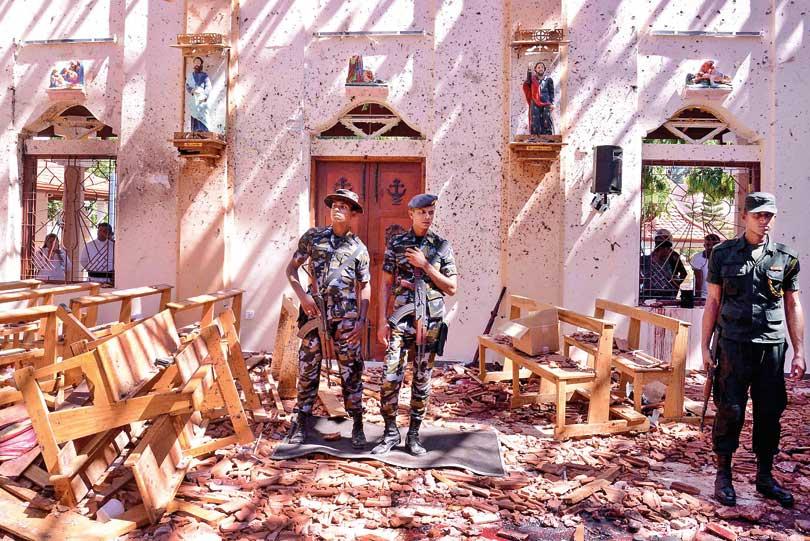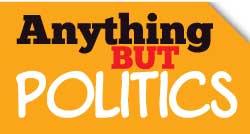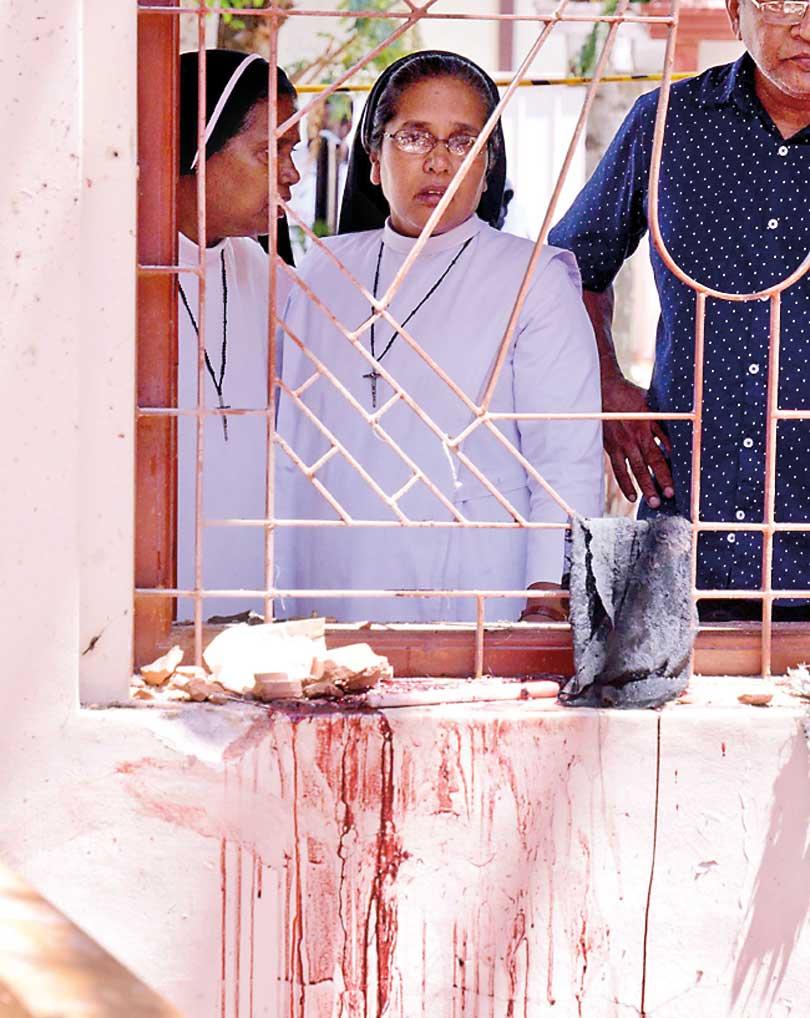Reply To:
Name - Reply Comment

 Sri Lanka was so accustomed to the peace that dawned after the end of the war on May 19, 2009 that it relaxed security measures. The country, under two successive Governments, dispensed with all wartime restrictions and relaxed security measures during the past ten years. However, the peace it enjoyed was punctured by the serial bombings targeting three high-end hotels and three places of Catholic or Christian worship on Easter Sunday (April 21). It happened when the country was about to celebrate its tenth anniversary after defeating tiger rebels.
Sri Lanka was so accustomed to the peace that dawned after the end of the war on May 19, 2009 that it relaxed security measures. The country, under two successive Governments, dispensed with all wartime restrictions and relaxed security measures during the past ten years. However, the peace it enjoyed was punctured by the serial bombings targeting three high-end hotels and three places of Catholic or Christian worship on Easter Sunday (April 21). It happened when the country was about to celebrate its tenth anniversary after defeating tiger rebels.
Only after three days did the ISIS or the Islamic State claim responsibility for the attack. It has been carried out in cohort with its local affiliate National Thowheeth Jamaath. Even before, people had a forgone conclusion that it could be the work of the Islamic State since the spate of bombings bore the hallmarks of such similar attacks executed by it elsewhere in the world.
Be that as it may, bewildered by the bombings that killed as many as 359 persons, the country was at a loss to understand as to why the Christian community was targeted in Sri Lanka. People were perplexed because the country never witnessed any communal clash involving local Christians and Muslims.
But, the Islamic State’s attack on Christianity is not something new or coincidental. In fact, the Islamic State has waged a global war against Christianity. Christians have been the target of their bombings and ambush attacks in many countries. In recent years, they have carried out a slew of such attacks targeting Christians in different countries such as Egypt and Ethiopia. In Iraq, Christians are a religious minority often persecuted or killed by the ISIS in senseless violence.
After beheading 21 Coptic Christians of Egypt in a beach in Libya in February, 2015, the ISIS released a video titled ‘A Message of Blood to the Nation of the Cross’. It speaks volumes about their hostility towards Christianity which is seen as the cornerstone of the western world’s ideology.
In the immediate aftermath of the bombings in Sri Lanka, confusion reigned not only in the minds of people, but also within the Government riddled with differences. President Maithripala Sirisena, who also holds the defence portfolio, was on an overseas visit, and his absence was a hindrance to convene a meeting of the National Security Council.
In the absence of the President, Prime Minister Ranil Wickremesinghe called for a meeting of the Cabinet Ministers at 3.00pm on Sunday to discuss the measures to be taken to restore normalcy. Around 15-20 Ministers attended it.
Finance Minister Mangala Samaraweera was concerned about economic consequences of the terror strike. He said this would discourage investors from coming to Sri Lanka.
The Prime Minister informed the meeting that specific intelligence on the attack had been conveyed to the Sri Lankan intelligence authorities by two foreign authorities. He said that he was not informed of such warnings, though.
“I have not been invited to the meetings of the National Security Council since October 26, 2018,” he said.
Megapolis and Western Development Minister Patali Champika Ranawaka quipped in at this point. He suggested that everyone should cast aside differences at the moment and work out a coordinated mechanism involving all stakeholders to crush the newly emerged terrorism in all its manifestations.
He asked for the execution of such a plan forthwith before the perpetrators of Sunday’s bombings flee. For that purpose, he asked for cordoning off of the entire city including the airport, but with specific safety arrangements for inbound and outbound foreign nationals.
 However, his call for the declaration of State of Emergency was rebuffed by Minister Mangala Samaraweera who saw it as a move that would infringe the democratic rights of people and signal a negative message on Sri Lanka to the international community at this hour.
However, his call for the declaration of State of Emergency was rebuffed by Minister Mangala Samaraweera who saw it as a move that would infringe the democratic rights of people and signal a negative message on Sri Lanka to the international community at this hour.
The Prime Minister, however, informed that President Sirisena had given permission only for police curfew to be clamped in the country.
Meanwhile, the Prime Minister arrived at the Defence Ministry to have a meeting regarding the measures to be taken in the wake of this crisis. However, the commanders of the three forces snubbed him making it unable for him to chair a high profile defence meeting sans the President.
On Monday, the Ministers sought a meeting with the President who had arrived in the country by the time. The meeting started at the Presidential Secretariat accordingly at 6.00 pm with the President in the chair. At the very onset, the President remarked, “You all only wanted to meet me. What have you got to discuss with me?
Public Enterprise Development Minister Lakshman Kiriella, who is also the Leader of the House, started speaking first. He said that the foreign intelligence authorities had tipped off Sri Lanka on two occasions- April 4 and 11 – on planned attacks by terrorists, but no tangible action was taken to avert them.
He asked as to why people were not alerted appropriately.
The President replied that he was not aware of such an attack. Also, he said that the warning letter that was circulated within the police circle had not been referred to his office. To drive home his point more effectively, he presented a diagram depicting the command structure of the defence establishment.
Then, Minister Samaraweera expressed his concern about the Prime Minister not being invited to the meetings of the National Security Council. The President spelled out his reason. He referred to an instance in which the need to ban the use of Burka worn by Muslim women as a safety measure was taken up for discussion by the National Security Council.
The President said what transpired at that meeting appeared in an English daily (Newspaper), and the contents suggested that the proposed ban on Burka was shelved due to objections by the Prime Minister. The President said that the news story had been planted in the paper with the intention of earning sympathy of the Muslim community for the Prime Minister.
The Prime Minister sounded unhappy over such remarks. He said he had no healthy ties with the particular English daily, and therefore he could not expect it to publish news stories aimed at propping up his image.
“The whole country knows the kind of relations I have with that newspaper,” he said.
Also, he said he used to attend the meetings of the National Security Council even after that was discussed.
All in all, it is clear again that policy clashes within the top brass of the Government has hamstrung decision making even in the event of a national calamity. The Ministers always differ from each other on every single issue, and it has made consensual approach next to impossible.
For example, Minister Ranawaka asked for the recall of battle hardened military officers in retirement to deal with the present crisis. But, his request was trashed by Ministers Mangala Samaraweera and Dr. Rajitha Senaratne.
“We cannot recall murderers to service,” they said in chorus.

Sunday’s bombings caused immense quality damage to the country in addition to the quantities damage. Tourism industry suffered immeasurable damage. The general public is greatly perturbed since the government is compelled to re-introduce wartime restrictions to ensure national security.
The terror strike is also bound to deliver a heavy political blow on the Government. On the one hand, the Government failed to act upon specific intelligence to counter terrorism emanating fresh quarters. On the other hand, the Government did not pay due attention to the signs and reports about radicalisation of some local Muslims, particularly in the eastern province- that is in spite of the warnings. On several occasions, questions were raised in Parliament on the possible threat to Sri Lanka from Islamic terrorism. Every time, the Government ministers either dodged the answers or belittled the threat, ostensibly fearing that any exposure would hurt the sentiments of local Muslims.
Whenever any mention was made about the ISIS links in Sri Lanka, the Muslim politicians and organisations were quick to deny it.
In November, 2016, then Justice Minister Wijeyadasa Rajapaskhe revealed that 32 Sri Lankans had been trained by the ISIS. Afterwards, he was only scorned by some Government ministers. Colombo district UNP MP Mujibur Rahaman slandered Rajapakshe for it.
Unlike countering LTTE terrorism, Sri Lanka will get international support in quelling a threat from the ISIS. Already, the major world powers- China, Russia, the United States and India- have agreed to provide every possible form of assistance to eliminate ISIS threats.
Sri Lanka is strategically positioned in the Indian Ocean with the world’s main trade arteries that run pass it. As such, a safe and peaceful atmosphere in Sri Lanka is important to the world powers for their own interests. Accordingly, these countries will not tolerate terrorism disturbing the peaceful order here.
Alongside, some western countries will try to make use of this opportunity to gain a foothold in Sri Lanka to serve their strategic interests in the Indian Ocean region.